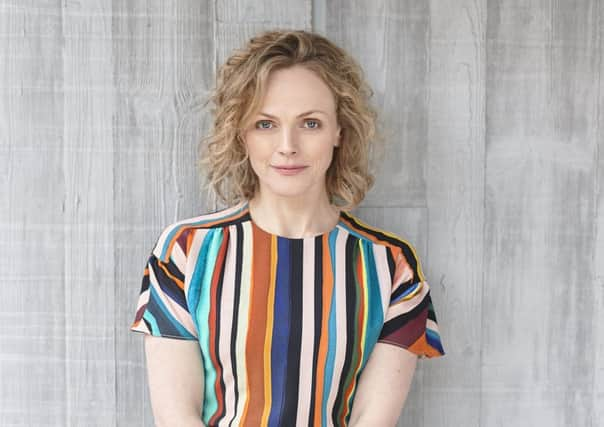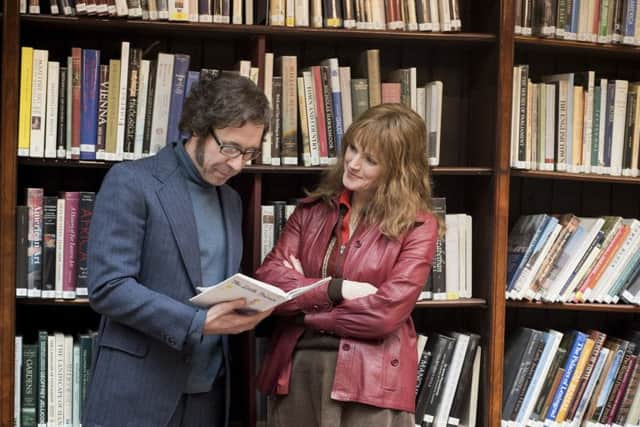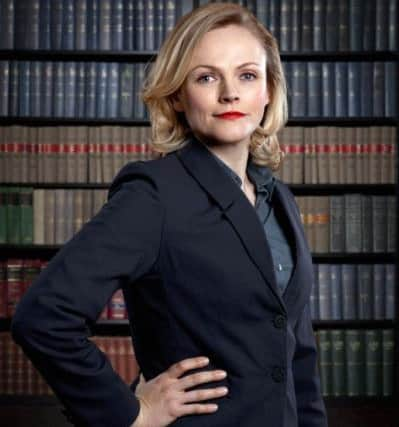Interview: Maxine Peake takes on stand-up in new film Funny Cow


It’s 1980s Blackpool and a young Maxine Peake and her dad are in a packed club on the front, watching a singer belting it out to a restless, day-trip audience. Not an easy crowd. Half way through the song someone bursts in and shouts “coach is ‘ere!” The audience gets up and leaves, apart from Peake and her dad, who sit on, loving it.
“She was great, really talented, singing away... and such disrespect! For me with my dad in Blackpool in the holidays, that was my first foray, seeing people perform. It was the first time I saw women being funny and singing, and I thought ‘oh, I’d like to do that’. But I’m not a singer… I wanted to be a comedian,” says Peake down the phone from Salford, where the actor and playwright now lives after 13 years in London.
Advertisement
Hide Ad“We watched a lot of comedy on the telly, when I was younger – The Goodies, Dick Emery and Les Dawson – who I think to this day was a genius – but all very male. Then later Victoria Wood and Julie Walters, Faith Brown... I loved impressions, and actor comedians who could morph into different characters too. I wanted to do character comedy,” says Peake.


Comedy and the clubs have come together at last for Peake in her latest film, Funny Cow, released this week. Written by Tony Pitts and directed by Adrian Shergold with music by ex-Pulp guitarist Richard Hawley, it stars Peake as a female comic on the 1970s and 1980s northern comedy circuit, alongside Paddy Considine, Stephen Graham, Alun Armstrong, John Bishop, Diane Morgan and Vic Reeves.
“I’ve always been fascinated by that working men’s clubs scene that was around when I was a child and that I went to when I was older. Especially women coming through that world. How did they stand it? And what sacrifices, compromises did they have to make?”
One of the few women able to cut it in the clubs with their tough audiences of pint-pot chauvinists, armed only with a pithy put-down and a tonne of talent was Sheffield-born Marti Caine, who went on to win New Faces and become a TV star.
“I used to love her on TV as a child,” says Peake. “I was fascinated, because she was glamorous yet funny and quite tomboyish too. We didn’t want to do a Marti Caine biog, but I looked at her life. She had some pretty dark times and that made her someone who could tough it out. It takes a certain type of woman to take on those men, because they were brutal.”


Now that Peake’s got a routine, courtesy of Funny Cow, would she ever consider giving stand-up a go herself?
Advertisement
Hide Ad“No. Because I couldn’t be Funny Cow. It was a very different period and the jokes I’m telling are not pleasant, because that period of time wasn’t pleasant. And relying on yourself and your own material to take people on, it’s just too exposing. I have nothing but admiration for those who do stand-up. I’m not brave enough to get up there.”
Funny Cow doesn’t hold back in showing the 1970s in all their racist, homophobic, sexist glory, according to Peake.
Advertisement
Hide Ad“They were horrendous jokes, crikey, and it’s not that long ago. When you watch shows from the 70s your jaw drops, you’re agog at the sexist and racist material. So Funny Cow is of its time, that’s what it was like in the clubs, on the telly and radio. If you get rid of it, it doesn’t show our difficult past and how far we’ve come. If you rewrite history you’ll never learn and move on.”


Peake established her comedy credentials early on, with her first TV role as Twinkle in Victoria Wood’s Dinnerladies, and over a 20 year career spanning TV, theatre and film, has demonstrated incredible versatility, playing everything from brassy to barrister with an attention grabbing combination of energy and fragility. On big and small screens as well as Twinkle, there was the fearless Vee in Shameless, the polished barrister Martha Costello in Silk, Myra Hindley in See No Evil and Stephen Hawking’s second wife in The Theory of Everything. Last year saw her being chased by a computerised canine in dystopian techie chiller Black Mirror and playing real-life sexual health worker Sara Rowbotham in the Bafta nominated BBC1 mini-series Three Girls, about the sexual abuse of teenage girls in Rochdale.
On stage she’s taken on everything from Strindberg’s manipulative Miss Julie to Williams’ fragile Blanche DuBois and the title role in a gender stereotype smashing Hamlet, later a film.
“I do make a conscious effort not to try and play the same sort of character each time,” she says, harking back to advice Victoria Wood gave her on Dinnerladies.
“She said to me just be careful because you will get stereotyped. You’re big, you’re blonde and you’re Northern, they will want to pigeonhole you. It was something I was already aware of. I’d never had any illusions that I’d have a struggle trying to get people to see me for different roles, not always brassy or ‘good time girl’ or…” she laughs... ‘healthy-looking’, which is a polite way of saying big. (Peake subsequently lost so much weight between Dinnerladies’ series that it had to be mentioned in the storyline.)


“Dinnerladies was brilliant,” she says. “Nothing to do with me, it was the writing and the performances and Vic gave the best lines to everybody else, that’s how generous she was.”
Advertisement
Hide AdPeake couldn’t believe her luck landing a part in one of her comedy hero’s shows when she was about to graduate from drama school – Wood had seen her in a South Bank Show documentary about her attempts to find sponsorship – and she credits Wood with kickstarting her career, with Shameless giving it another huge boost several years later.
“I just sort of got into RADA and went ‘oh wow, that’s wild, how did that happen?’ then three months before I was leaving they said you’ve got an audition for this Victoria Wood sitcom. I thought I won’t get it, but I’m going to sit in a room with Victoria Wood!”
Advertisement
Hide AdBorn near Bolton in Greater Manchester in 1974, the second of two daughters of shop and careworker Glenys, and Brian, a lorry driver, Peake grew up political. When her parents divorced she stayed with her mother until she was 15, then lived with her grandfather while finishing her exams when her mum moved. Her happiest memories stem from sitting in her grandad Jim’s kitchen, talking, either side of the table after his shifts on the assembly line at Leyland Motors. She laughs. “He used to say, I made a little bit of that Popemobile, although like me he was an atheist.
“He’d have the radio on, with two chairs looking out into the back garden. Sitting there, talking to him about life, politics, you know. I was so lucky I had him and those conversations. Often I think ‘Oh, I wish I could talk to Jim about this!’ He always knew; he had age and experience, and wisdom comes with that. He’d say just watch what happens here and I’d think ‘he’s being a bit cynical’, but two months later, he’d be right.”
As supporter of the Labour Party appearing in an election broadcast at the last general election, and backer of Jeremy Corbyn, does she get her politics from her grandad?
“Oh God definitely,” she says. “He still influences everything I do, politically through my work and bits and pieces I’ve done recently. He’d have been really proud that I started writing too. Not because he’d think it’s great, but because I’d put pen to paper.”
It was at school that Peake read Jim Cartwright’s play Road, with its familiar places and voices, and joined a youth theatre in Bolton, then the Royal Exchange in Manchester. After a performing arts course at Salford College and amateur theatre, she landed a place at RADA, something she coped with by not thinking about it too much.
“Otherwise it would overwhelm you,” she says. “That’s how I’ve managed not to be completely bonkers. RADA then working with Victoria Wood, no! Sometimes when I look back, I think ‘wow!’ but at the time my family were ‘oh, that’s great, anyway...’ It was always don’t get above your station. And if you talked about it too much it was ‘that’s enough now, stop showing off.’” She laughs, approving. “I’d be the same if I were a parent.”
Advertisement
Hide AdTurning her hand to writing, Peake has championed the female and working class experience, with three plays so far. Her 2012 play, Beryl: A Love Story on Two Wheels, about Leeds-born cyclist Beryl Burton, was broadcast on BBC Radio 4 then adapted for the stage, with two successful runs and tours.
“Beryl was the first play I did, and I had me hand over me eyes going ‘God, I don’t know what this is!’ But I think if you pick good subject matter, people are there. I’m reluctant to call myself a writer because I’ve got a long way to go, but the more you do it… It’s like acting, it took me about ten years before I could think ‘oh yes, I’m an actor.’
Advertisement
Hide AdAfter Beryl came The Last Testament of Lillian Bilocca, another true story about women fighting for fishermen’s rights in 1960s Hull, now a soon-to-be released documentary. And opening at the Royal Exchange in July is Queens of the Coal Age, which aired on Radio 4 in 2013. It follows the story of Anne Scargill and three other women who occupied Parkside Colliery in Merseyside to protest against pit closures in 1993.
“They went down on a tour and didn’t come up for five days!” She laughs. Anne Scargill took Peake and some of the production to have a look at Kellingley Colliery just before it closed, in the interests of research. “When we got there the pit manager said WE could go down, but under no circumstances could Anne. We all laughed. And he went ‘I’m not laughing, she is not going down. It’s more than my job’s worth’. So we went down, she stayed up.”
Peake is a strong believer in the power of words and drama to effect lasting social change, as well as direct political action.
“TV especially can make a big difference,” she says, “getting into people’s houses. Like the response to Three Girls, that blew me away. People wanting to share experiences, or say they had judged those girls but now realise there is no such thing as child prostitution, it’s just abuse. So to change people’s way of thinking, sometimes TV is a short, sharp way into their psyche.”
For Peake, when it comes to politics, it’s not as simple as winners and losers, and change doesn’t happen overnight.
“Even though the miners’ strike wasn’t successful in grand terms – the unions were smashed and Thatcher had her way – we should never forget the struggle is as important as the victory. Women became emancipated; a lot went and studied or got careers or said I don’t want this relationship any more, to live this life any more. So if we don’t fight the battles, we’re never going to have the small victories that come with it, that’s important too.”
Advertisement
Hide AdWriting has also given Peake a new appreciation for actors and how they bring words alive, “you think ‘oooh, did I write that?’” and there’s also the added benefit of being able to work at home.
“I don’t even have to get out of my pyjamas. I just get up and sit in my little room that I write in.”
Advertisement
Hide AdRecently, however, the routine has been interrupted by the arrival of a rescue Bedlington terrier cross, who Peake loves taking for walks near her Salford home.
“I wanted to call him Fidel, but He said: ‘I’m not shouting ‘Fiddle!’ down the park’, so he’s Castro.”
‘He’ is partner Pawlo Wintoniuk, an art director she met on a play about the miners’ strike “years ago, probably about 14. He’s patient and supportive and so laid back – I suppose you’d have to be to live with me! And his sense of humour; he makes me laugh every day. He will stealth up with a joke and catch you off guard.”
Wintoniuk also does the cooking, because Peake hates it, which is a problem now he’s away working in Glasgow on BBC drama The Cry.
“Yeah, I’m surviving on crumpets and goat’s cheese. And before that he was working on Shetland. Isn’t that a brilliant series? I went up and spent some time with him there… I was like, ‘can I come and live here?’”
Shetland will have to wait as she’s due in Manchester this summer, starring in Samuel Beckett’s Happy Days at the Royal Exchange. Having always loved theatre as much as TV, and after playing Hamlet, she wouldn’t mind nailing another traditionally male role.
Advertisement
Hide Ad“Ooh, I’d like a go at Richard III,” she says. “There’s the odd decent female role in Shakespeare, but you struggle sometimes. So it’s lovely to meet young actresses who do Hamlet as an audition speech after seeing me. When’s the next female Hamlet? Come on, there are three male Hamlets every year!
“I think one of the reasons I wanted to do it is because a lot of female roles lack physicality. We always get roles where we don’t particularly break into a sweat.”
Advertisement
Hide AdBreaking into a sweat, and a run, is something Peake did in Netflix’s Black Mirror, when the fact she once played rugby league for Wigan Ladies surely stood her in good stead against that death on four legs cybercanine. She demurs.
“God no, I only got a week’s notice so there wasn’t time to train. I was gasping for breath! But it was great, at 42, to get an action part where you’re running around the countryside, leaping over fences, climbing up trees and doing handbrake turns.” She laughs.
Also due for release this year are two films, Fanny Lye Deliver’d, with Charles Dance and Freddie Fox, and The Dark Outside, with a backdrop of slate mining in 1840s Wales.
“Fanny Lye is set after the Civil War, about a family on a smallholding in Shropshire and it’s a sort of female emancipation story – again!” She laughs. “And The Dark Outside is about capitalism and its evils and how it affects the everyday, another political one!”
She has also been filming comedy drama The Bisexual for Channel 4, written, directed and starring Desiree Akhavan of cult US hit Appropriate Behaviour. “It’s what it says on the tin. I play the girlfriend,” says Peake.
But before these hit the screens, Peake is delighted to be part of the much-anticipated Peterloo, from multi-award winning director Mike Leigh. An epic with an ensemble cast, it’s the story of the 1819 Peterloo Massacre, when cavalry charged into a crowd of more than 60,000 protesters in Manchester, killing 15 and injuring 600.
Advertisement
Hide Ad“I actually asked if I could be in it. I had no shame. Because Peterloo is something my heart is really close to, coming from the north. I sent him a little postcard saying, ‘please Mr Leigh, can I be in your film?’ and he wrote back and went ‘course you can’, so that was all right,” she says.
It seems that along with age and experience, Peake is coming into her own as both an actor and writer, with a dash of the wisdom dispensed by grandad Jim.
Advertisement
Hide Ad“Sometimes I wish I’d been that bit bolder when I was younger, followed my heart. I was always so self-conscious, it used to eat me up. But now I think ‘oh, nobody cares!’ They’re not bothered whether you’re making a fool of yourself or not. So why worry?”
@JanetChristie2
Funny Cow is released on Friday